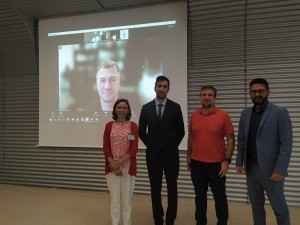Jordi Aragón Artigas, PhD student under the supervision of Prof. Julio Lloret-Fillol (ICIQ), has defended his PhD thesis entitled “Visible-light metallaphotoredox strategies for organic transformations through the cleavage of Csp3−Cl bonds” (assigned to the Inorganic and Physical Chemistry Department of the Universitat Rovira i Virgili) publicly on June 23rd.
The members of the evaluation committee were: Prof. Dr. Paolo Melchiorre (ICIQ), Prof. Dr. Mariola Tortosa (Universidad Autónoma de Madrid), and Prof. Dr. Liviu Mirica (University of Illinois)
Dr. Aragon is from Barcelona. He obtained his bachelor’s in Chemistry and master’s in Organic Chemistry from Barcelona University and in 2017. Then, he joined ICIQ’s Lloret-Fillol group for his PhD. For the last five years, he has enjoyed living in Tarragona’s old town. In his spare time, he likes playing soccer and sports in general, as well as board games. He also enjoys Egyptian mythology and wants to visit this country once he finishes his PhD.
What is your thesis about? What interested you about this topic?
I have developed methodologies that use catalysts and light to activate inert bonds, specifically C-Cl. I was keen on joining ICIQ for my PhD to learn from the people who are pioneering the field of photocatalysis. I wanted to develop new photocatalytic reactions that could be useful for the pharma industry.
What do you want to achieve as a scientist?
I’m interested in finding applications to the research we carry out. In high school, I wanted to become a doctor, now I want to contribute to people’s well-being through chemistry. In a way, I’d like to go back to medicine through chemistry.
What did you enjoy the most from your thesis?
Being able to use ICIQ’s great equipment, including the photoreactors developed in-house. I really liked working in the High Throughput Experimentation lab because it allows researchers to run multiple reactions at the same time, so you have much more information. I don’t think I would have been able to do as many things as I did during my PhD anywhere else.
What do you wish you had known at the beginning of your doctorate?
That what you learn during your bachelor’s is not what researchers do. At university, you’re taught very basic lessons, and when you start your PhD, especially at ICIQ, you first need to cross a huge wall of information to be up-to-date and keep up with the research going on in the lab. It can feel like a struggle to reach that point, but once you do, it’s extremely useful and it will help you grow as a researcher.
If you were to become a piece of lab equipment, what would you be?
A parallel small HTE photoreactor because it allows you to run many different photocatalytic reactions in parallel and saves you much time.
My favourite molecule is… dichloromethane because even though it’s an inert and useful solvent, my thesis demonstrates that its C-Cl bond can be activated, using them as a reagent.
Tell us something about you that people might not know: I am member of a gospel choir as a tenor, the New Zombies, the choir from the Medicine faculty from the UB.
What’s next?
I have just made the leap to industry, as an organic chemist in the R&D department of a pesticide company, SEDQ Healthy Crops, in Barcelona.
